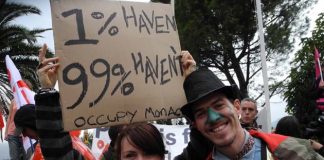Anger at the massacres in Gaza exploded onto streets around the world in January. From Beirut to Sydney, huge crowds denounced Israel, their chief backers the United States and the complicity of many Arab and western governments.
These powerful mobilisations undoubtedly helped to force Israel’s retreat.
Their spirit was carried by many in the crowd of two million that turned out to the inauguration of new US President Barack Obama. The crowd booed the outgoing President George Bush, figurehead of the “war on terror”.
The outpouring of support for America’s first black President is representative of a deeply held desire for change. The unprecedented size of the crowd represented a yearning for relief from years of war as well as the intensifying financial pain, and was the culmination of an election campaign which mobilised tens of thousands.
There was jubilation during Obama’s inauguration speech when he talked of a shift away from the policies of the Bush years.
But the hope for change will not be fulfilled by Obama. An underlying theme of his speech was the gravity of the crises facing the US economy and its empire and the need for sacrifice on the part of ordinary people. He praised US troops occupying foreign lands and “the selflessness of workers who would rather cut their hours than see a friend lose their job”.
But corpses keep piling up in Iraq and Afghanistan and job losses are accelerating, with more than half a million jobs disappearing in the US in December. No such sacrifices are expected from the corporate elite.
Obama’s policies are set on a collision course with the demands of his supporters. He was silent through Israel’s offensive and has used addresses since taking office to criticise suffering Palestinians in similar tones to Bush.
Obama’s support was key to the passage of the $1 trillion bailout package in the US Congress last year, essentially a hand-out to the banking sector. A similar package looks set to pass under the new administration.
In Australia, calls for sacrifice on the part of workers are growing more explicit in the face of an impending recession. The desperate situation facing Australia’s major trading partners—seen in the 35 per cent decrease in Japanese exports and the major contraction in China’s economy—is fueling a major loss of jobs (see page 7) and prompted Kevin Rudd to call for a wage freeze.
Australia’s experience over the past year demonstrates clearly that electoral change does not shift the priorities of the system. Australian workers face the growing economic crisis with fewer rights than they had when the Liberals formed government in 1996. And the Labor government’s commitment to neo-liberalism means we will continue to be denied the major social spending programs needed to head-off recession.
Rudd has refused to criticise Israel for its butchery in Gaza. The bloody calculus of his support for the US alliance has been presented more starkly than at any time since he took office.
The tens of thousands on Australia’s streets against the Gaza bombing gave us one of the clearest examples yet of how to orient to the Rudd government. Protecting workers from the gathering economic storm, and innocents from US-sponsored bombs, requires a fight.




